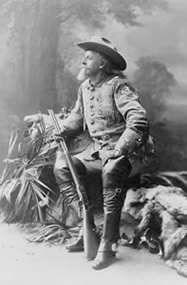
"The Gun That Won the West"
In the 1800s the idea of a repeating rifle was finally realized by Oliver Winchester, the largest stockholder of the New Haven Arms Co. of Connecticut. He was assigned US patent No. 5501, which protected improvements to the Henry rifle. The new technology included a spring-closed loading port on the right-hand side of the frame, directly at the rear of the magazine tube, and resulted in the first reliable lever-action repeating rifle, produced as the first Winchester, Model 1866.
Famous for its rugged construction, the original Winchester rifle allowed the rifleman to fire a number of shots before having to reload: hence the term, "repeating rifle." Manufacturing of the Model 1866 started in Bridgeport, Conn. in 1867; the Winchester Repeating Arms Company moved to New Haven in 1871. The Company also manufactured and licensed to the U.S. government the M1 Carbine, the standard 30 caliber weapon used by Allied forces in World War II.
The U.S. Repeating Arms Co. (owned by Herstal Group, a Belgian gun-making conglomerate that also owns Browning Arms Co.) announced in January 2006 that it would close its Winchester plant in New Haven on March 31. The plant closing ended production of a celebrated line of rifles and shotguns known collectively as "the gun that won the West."

Rifling refers to spiral grooves that have been formed into the barrel of a firearm. It is the means by which a firearm imparts a spin to a projectile to gyroscopically stabilize it to improve accuracy.
A repeating rifle is a single barreled rifle containing multiple rounds of ammunition that are loaded from a reservoir chamber (magazine) by means of a manual or automatic mechanism.
Source: Library of Congress.
*******
Buffalo Bill Historical Center
Disclosure: We are independently owned and the opinions expressed here are our own. We do have advertisements with links to other sites on our pages, and may receive compensation when you click on one of those links and/or purchase something from one of those sites.
Copyright © D. J. McAdam· All Rights Reserved